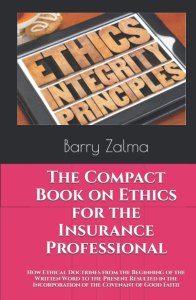New Books for Insurance Professionals Now Available at Amazon.com

Insurance is, by definition, a business of the utmost good faith. This means that both parties to the contract of insurance must act fairly and in good faith to each other and do nothing that will deprive the other of the benefits the contract of insurance promised.
Without the covenant of good faith and fair dealing, and ethical people who work in the insurance industry applying and fulfilling the covenant, effective insurance to spread the risk of loss to a large community of insurance professionals, is impossible. One cannot act fairly and in good faith without being a person with a well-formed ethical compass.
In 1776, Lord Mansfield acting as an appellate judge serving in the House of Lords of Britain (the predecessor of the United Kingdom) for the first time referred to the covenant of good faith and fair dealing. In the case designated: Carter v. Boehm S.C. 1 Bl. Burr 1906, 11th May 1766. 593, 3 Lord Mansfield in the British House of Lords stated the rule of uberrimae fide (Latin for utmost good faith).
Ethics & Ethical Behavior are Essential to Every Insurance Professional
Good faith forbids either party by concealing what he privately knows, to draw the other into a bargain, from his ignorance of that fact, and his believing the contrary.
The implied covenant is simply stated by explaining that no party to a contract of insurance should do anything to deprive the other of the benefits of the contract.
 Since at least 1766, the business of insurance is a business of the utmost good faith. Each party to a contract of insurance must deal with each other ethically. This book will consider and explain different ethical concepts from the Code of Hammurabi more than 3000 years ago to modern ethical philosophers.
Since at least 1766, the business of insurance is a business of the utmost good faith. Each party to a contract of insurance must deal with each other ethically. This book will consider and explain different ethical concepts from the Code of Hammurabi more than 3000 years ago to modern ethical philosophers.
The general duty of good faith and fair dealing incorporated by reference into every policy of insurance requires a complete understanding of ethics and ethical behavior.
The covenant is mutual, and the principles of good faith and fair dealing impose an affirmative obligation on the insured to cooperate as much as it requires the insurer to treat the insured fairly with regard to every claim presented.
Without the covenant of good faith and fair dealing, and ethical people who work in the insurance industry applying and fulfilling the covenant, effective insurance to spread the risk of loss to a large community of insurance professionals, is impossible. One cannot act fairly and in good faith without being a person with a well-formed ethical compass.
In 1776, Lord Mansfield acting as an appellate judge serving in the House of Lords of Britain (the predecessor of the United Kingdom) for the first time referred to the covenant of good faith and fair dealing. In the case designated: Carter v. Boehm S.C. 1 Bl. Burr 1906, 11th May 1766. 593, 3 Lord Mansfield in the British House of Lords stated the rule of uberrimae fide (Latin for utmost good faith):
This book considers and explains different ethical concepts from the Code of Hammurabi more than 3000 years ago to modern ethical philosophers.
The Covenant of Good Faith and Fair Dealing is a statement of the ethical basis of the insurance business.







